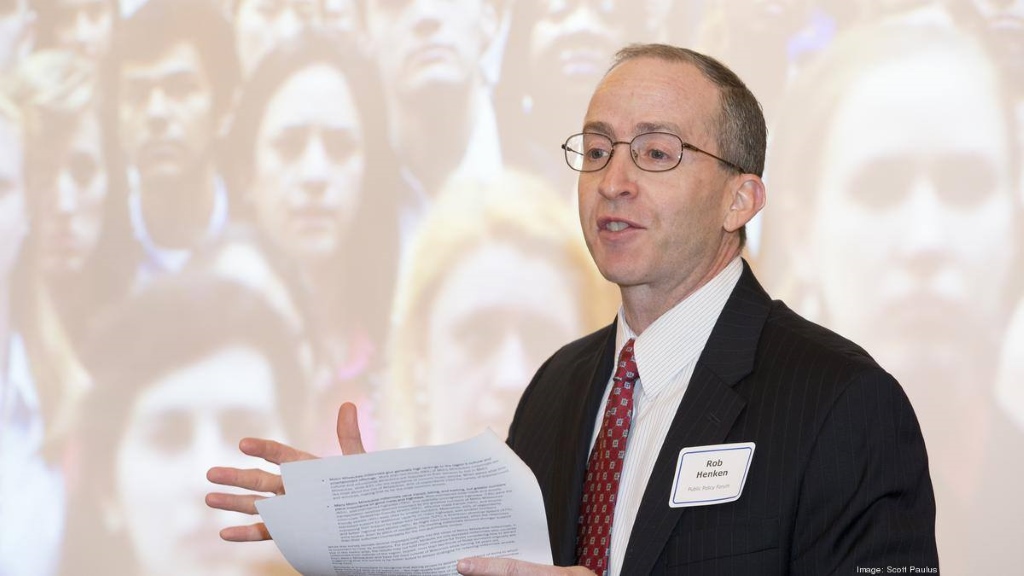State’s New Top Policy Wonk
Rob Henken will run merged WisTax and Public Policy Forum. Oh, the attacks he will face.
Todd Berry is retiring after 24 years as leader of the Wisconsin Taxpayers Alliance, and probably won’t miss all the complaints he got. In today’s era of ultra-partisan, scorched-era politics, all journalism and all research is examined with a fine tooth comb for any evidence of bias by both conservatives and liberals, and WISTAX got plenty of that from both Republicans and Democrats in the state Capitol. “I believe I am the only person in the state who has been attacked publicly on live television statewide by governors of opposing parties,” he once noted.
But Berry’s decision to retire left his board members looking for a replacement, and that search led to Milwaukee’s Public Policy Forum (PPF) leader Rob Henken, who turned down the job, but soon became part of a discussion about merging the two groups. And voila, the boards of both groups eventually decided to merge into one organization, to be called the Wisconsin Policy Forum.
It’s a huge change: both groups go back a long time, the PPF to 1913 and WISTAX to 1932; but there are clear advantages to merging the two groups. Still, for Henken and his board, the results of this decision may shock them. The PPF, you see, did reports only on southeastern Wisconsin and while it faced occasional complaints about its reports, the group wasn’t operating in the hyper-partisan atmosphere of Madison.
By contrast, Berry and WISTAX were a frequent target for attacks from both the left and right. Republican Tommy Thompson once met with Berry’s bosses, his board of directors, to complain about its reports revealing the then-governor’s uber-liberal style of taxing and spending. Then when Democrat Jim Doyle was governor, its reports won condemnation from liberals like longtime Madison Mayor Paul Soglin who declared that the group “misleads, distorts and will not come clean,” while fellow liberal, the late Ed Garvey, called the Alliance a “Republican front organization.”
Meanwhile, WISTAX was facing a changing world, with online replacing print, and its bi-weekly newsletter and monthly magazine looking a tad old-fashioned. “They did need to update their product,” Henken says. The financial support for WISTAX was dwindling, with the budget declining by 18 percent in real dollars since 2013, dropping from about $697,000 to about $603,000, the group’s federal tax form shows.
Still, WISTAX was in no danger of going under, as it had a secret advantage: an endowment of some $3.5 million in investments, which spun off an annual return to help support the group. This compares to the Public Policy Forum’s tiny nest egg of about $679,000. Combining the two groups brings the combined total to nearly $4.2 million.
“That’s a big benefit of the merger,” Henken notes. “The earnings from this money allows us to be less reliant on project-oriented grants and leaves us flexibility to respond to a current issue.”
The merger also provides an opportunity to save money by eliminating any duplication between the two groups. The biggest item in that category is the director’s salary for each group: Berry earned about $205,000 total compensation and Henken about $179,000, the groups’ most recent federal tax forms show. Henken says he will get a small raise for taking over the bigger, combined entity.
He will retain the longtime number two man at WISTAX, Dale Knapp, a trained economist who keep his WISTAX title of research director for the new group. Merging forces, Henken says, will also allow the group to have more staff specialists in various fields. The new group will maintain offices in both Milwaukee and Madison, where WISTAX was based.
WISTAX was narrower in scope, concentrating on the tax impact of state spending and policy-making. The PPF, in its early days as the Citizens Governmental Research Bureau, operated similarly, while looking at local governments in metro Milwaukee. Both groups had boards with business people, and their mission was to push governments to operate in a more business-like fashion and spend fewer tax dollars.
But in the late 1980s, the Milwaukee group broadened its mission and changed the name to Public Policy Forum and began taking on research that wasn’t just about government budgets, adding reports on economic development and education and local schools. The group also has a much bigger board of directors — some 60 members — and under Henken’s leadership it has diversified from just business people to add representatives from non-profits, universities and local government. Henken says the board is adding 15 more members, to give it more geographic reach and embrace the entire state.
The idea of the PPF expanding to become a statewide entity had been discussed over the years by its leaders, Henken says, so this merger was a chance to do so. And for WISTAX it meant getting the leader they had seen as a worthy successor to Berry.
The other question relates to the partisan age we live in. Increasingly, most research is paid for by one ideological side or the other, with groups on the right like the Bradley Foundation and MacIver Institute, and on the left like One Wisconsin Now. (The right has far more money to fund such research.) The Wisconsin Policy Forum may be the last independent non-partisan research group in the state, and it will get hit by critics from both sides.
Which Henken says he is ready for: “It’s important to have an organization doing research that people can see as not having an ideological agenda. I feel like I was made for that job.”
Henken notes he got his start working seven years on Capitol Hill for two different Democratic congressmen, followed by 5 years as research director for the liberal Milwaukee County and five years working for Republican and Milwaukee County Executive Scott Walker as his director of Health and Human Services and then as Director of Administrative Services.
“I’m middle of the road, I’ve worked for both Democrats and Republicans,” Henken says.
He may be one of the last such people in Wisconsin. But the odds are his new group’s research will still get plenty of criticism.
If you think stories like this are important, become a member of Urban Milwaukee and help support real independent journalism. Plus you get some cool added benefits, all detailed here.
Murphy's Law
-
Top Health Care Exec Paid $25.7 Million
 Dec 16th, 2025 by Bruce Murphy
Dec 16th, 2025 by Bruce Murphy
-
Milwaukee Mayor’s Power in Decline?
 Dec 10th, 2025 by Bruce Murphy
Dec 10th, 2025 by Bruce Murphy
-
Total Cost of Foxconn Is Rising
 Dec 8th, 2025 by Bruce Murphy
Dec 8th, 2025 by Bruce Murphy






















Mr. Henken can tell Republicans what they want to hear.
Per former Federal Bank of NY Reserve Chairman, Beardsley Ruml, in 1946, “(Federal) Taxes For Revenue Are Obsolete.”
https://www.huffingtonpost.com/warren-mosler/taxes-for-revenue-are-obs_b_542134.html
Mr. Ruml did not mean that taxes, themselves, were obsolete. They aren’t. In case of demand-pull inflation–too many dollars chasing too few goods–federal taxes reduce aggregate demand. The federal government, however, does not need the revenue. Its spending is NOT constrained by how much tax revenue it can raise. State and local governments are different. Their budgets have to balance, “just like a family’s.”
Former PIMCO chief economist Paul McCulley agrees, “Remember, the government sector’s liability is the private sector’s asset!”
https://www.pimco.com/en-us/insights/economic-and-market-commentary/global-central-bank-focus/facts-on-the-ground
Per economist Pavlina Tcherneva, four-page gem, “Antidote to Deficit Phobia:”
“If we demand that the government runs a surplus, then we are demanding that we, the private sector run a deficit.”
https://docs.wixstatic.com/ugd/f4c1a3_6b35b43a6aba48028d77f08750e05382.pdf
There’s plenty of stuff we can run out of, drinkable water; safe food, sustainable energy, some metals, minerals, and medicines. We can’t run out of dollars. If the U.S. incurs a debt in something NOT denominated in dollars–oil or gold for example–all bets are off.
Again from Prof. Ptcherneva: ““Should the government spend willy-nilly on whatever it pleases since it doesn’t face involuntary default?” and the answer to that question is most definitely no. Not all deficits are created equal: some create more inequality and more rentier income, as it seems to be the case in the current crisis. Others can cause inflation. Yet others can directly create jobs, public investments, and productive capacity without generating inflationary pressures. In sovereign currency nations, a truly responsible government spending is one that is measured not by the debt-(or deficit)-to-GDP ratios, but by the real impact of that spending on the economy—job creation, poverty alleviation, stable prices, income distribution, social goods provisioning are all good measures for assessing how responsible government policy has been.”
Why are we impoverishing Americans to pay dollars to the U.S. Treasury, when it has an infinite supply? The Treasury creates most dollars electronically, just like Lambeau creates points on its scoreboards. Ever hear a Packer fan worry the scoreboards would run out of points? How do the fiscal illiterates send real output back in time? How much would a 2017 Jeep Grand Cherokee fetch in 1980?
The dollar is a public monopoly. Laws about abusing federal contracts–Medicaid for example–remain in force. It’s still stealing from the taxpayers. Any country that issues its own currency, Mexico, Canada, Japan, China, Russia, Great Britain, … has the same fiscal space.
Mr. Henken can tell Democrats what they want to hear. Vastly increased federal spending on health care, green infrastructure, education, and research is the way to prosperity.
We don’t need the Chinese or anyone else to buy our bonds. It’s beyond unfortunate that both political parties are fiscal illiterates—ignore what’s become known as “Modern Monetary Theory” #MMT . https://www.thenation.com/article/the-rock-star-appeal-of-modern-monetary-theory/
One of the many things I’ve learned about Rob over the years is that in addition to being very smart ..He is also tough. I can’t wait to see the quality data and insight that He and the new structure will bring to our state.
(The right has far more money to fund such research.)
That depends on what you call “research”.